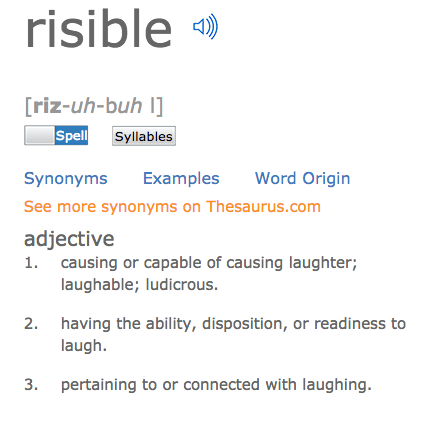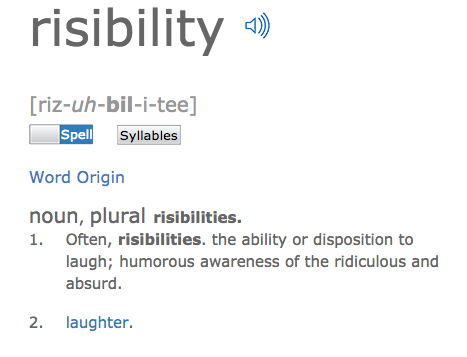|
See that girl with the laurel leaves in her hair? That's me, on graduation day, getting ready to walk across the stage and receive my Classical Diploma from Phillips Exeter Academy.
(Okay -- FINE. They're not laurel leaves. They're the kind of leaves that grow on the side of Langdell Hall, because no one told me you had to ORDER your crown before graduation. I mean... it's not like I had to order my diploma!) My Classical Diploma means that I took four years of Latin and a year of ancient Greek. It means I know things. Like why it's so ridiculous that half my friends spell ridiculous with an -e. It's ridiculous, because the word "ridiculous" comes from the Latin verb rideo, ridere, risi, risus, -a, -um. It means "to laugh." It's also the root of "ridicule" (not redicule). And the root of the less-commonly used "risible". And, of course, "risibility". I get why people make the mistake. "Re-" feels like a much more common way to begin spelling a word than "ri-". For example, social justice warriors regurgitate far left indoctrination, even if it doesn't make sense. If we want to teach children to focus on learning rather than performance goals in schools, we should give them opportunities to retry and retake the test. We review products on Amazon. It's an easy mistake to make. Basically, all that's happening is you're overgeneralizing a pretty reliable rule. Knowing Latin -- having read Virgil and Cicero and Caesar in their original language -- is the reason why I have literally never misspelled the word ridiculous. It's also why I hate the word vagina, which literally translates to "sheath" or "scabbard." MY body parts are a function of ME -- not a function of the male sword. It's also why, due to the nature of the readings we did in Latin class, I can remember about eight different ways to say "kill," as well as the connotations each word has -- did the person die in battle? Did they deserve it? Were they murdered? But I don't believe I ever learned a basic greeting -- "Hi! How are you?" I totally loved taking Latin, and have zero regrets about studying Latin and Greek. (I only regret scoring so highly on the SAT II Latin that I tested out of my college language requirement, because I seriously wish I knew a modern language. #humblebrag?) Not only did I intrinsically enjoy the history and the language, but I also learned a lot about learning from taking them. Here's a story I shared in How to Write Your University of Michigan Supplemental Essays that illustrated why: “GUM? HOW DARE YOU!???? I’LL RIP YOUR TONGUE OUT!” A familiar voice fills the corridor as I sprint to Greek class. If I hurry, I’ll make it before Dr. Morgan locks the door, refusing entry to latecomers. (I’ve been shouting, “Hold the door!” since waaaay before it was cool.) Welcome to the Exeter Classics Department. Anyone who’s studied a dead language would agree that the field attracts a certain… type. We’re all weirdos. That’s why I love it. That, and the fact that humans reach a state of “flow” upon achieving the right combination of challenge and mastery. Latin and Greek are the hardest classes I’ve ever taken–but my algorithmic thinking style has helped me excel, even while being berated by 80-year-old scholars in checkered bowties. This helped me build academic confidence and cultivate a disciplined, analytical approach to problem solving. Word order doesn’t matter; when the subject of a sentence is a quarter of the way down the page, the verb is in the first line, and there are about twelve clauses and conjunctions in between -- not to mention several figures of speech (including the word “salt,” which I’m supposed to magically know means “ocean” because it’s a metonomy) -- translations get tricky. (Want to understand what it’s like to do Latin homework? Remove all the punctuation from the previous paragraph, put it in a blender, and then eloquently unscramble it. And remember: that was only one sentence!) I won’t pursue this passion in college -- but I’m certain that I’ll use the cognitive skills I’ve developed in every single class. *** Ah, nostalgia! Just for fun, I've decided to link to a few of my favorite blog posts -- using famous Latin sayings as titles. Vincit qui se vincit. (He conquers who conquers himself.) Aqua vitae. (Water of life.) Non sibi. (Not for oneself.) Vitanda est improba siren desidia. (One must avoid that wicked temptress, Laziness.) Disiecti membra poetae. (Limbs of a dismembered poet.) Flectere si nequeo superos, Acheronta movebo. (If I cannot bend the will of Heaven, I will move hell.) Vestis virum reddit. (The clothing makes the man.) Estne volumen in toga, an solum tibi libet me videre? (Is that a scroll in your toga, or are you just happy to see me?)
2 Comments
Jadzia
6/28/2017 03:30:40 am
I once asked my Latin teacher for clarification on the distinctions between different words for killing. She reeled off a list of words and their implications (murder, assassination, butchery etc.) then beamed with joy and said "It's a beautiful language isn't it?"
Reply
6/29/2017 05:19:07 pm
Haha, sounds about right for a Latin teacher. One of my favorite passages from The Aeneid was Dido's speech:
Reply
Leave a Reply. |
About the Author

Eva is a content specialist with a passion for play, travel... and a little bit of girl power. Read more >
Want to support The Happy Talent? CLICK HERE!
Or Find me on Patreon!
What's Popular on The Happy Talent:
Trending in Dating and Relationships:
What's Popular in Science: Playfulness and Leisure Skills:
Popular in Psychology and Social Skills:
Categories
All
|





























 RSS Feed
RSS Feed